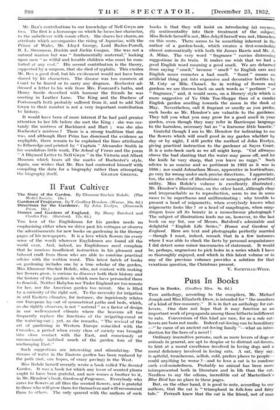II Faut Cultiver THE love of the Englishman for his
garden needs no emphasizing either when we drive past his cottages or observe the advertisements for new books on gardening. in the literary pages of his newspapers. It is a love which flowers (in every sense of the word) wherever Englishmen are found all the world over. And, indeed, no Englishman need complain that he receives insufficient instruction in his pleasant and beloved craft from those who are able to combine practical advice with the written word. This latest batch of books on gardening includes one by a true scholar of the garden, Miss Eleanour Sinclair Rohde, who, not content with making her flowers grow, is curious to discover both their history and the history of the gardens in which men have persuaded them to flourish. Neither Babylon nor Tudor England are too remote for her, nor the American garden too recent. She is filled by a curiosity of the right sort. To the necessity for irrigation in arid Eastern climates, for instance, she ingeniously relates our European lay-out of symmetrical paths and beds, which, as she rightly observes, is not " natural " as a factor of design in our well-watered climate where the heavens all too frequently replace the functions of the irrigating-canal or the watering-can ; yet, as she remarks, "The revival of the art of gardening in Western Europe coincided with the Crusades, a period when every class of society was brought into close contact with the East, and consciously or unconsciously imbibed much of the garden lore of the unchanging East."
Such suggestions are interesting and stimulating. The stream i of water in the Eastern garden has been replaced by the path (not, one hopes, of crazy paving) in the West.
Miss Rohde herself recently wrote a book called The Scented Garden. It was a book for which any lover of scented plants ought to have been grateful, and now comes a brother to it, in Mr. Henslow's book, Gardens of Fragrance. Everybody who 'cares for flowers at all likes the scented flowers, and is grateful tb those who will grow them for themselves and will recommend them to others. The only quarrel with the authors of such books is that they will insist on introducing (a) coyness, (b) sentimentality into their treatment of the subject. Miss Rohde herself is not, Miss Jekyll herself was not, blameless on this score. There seems to be something inherent in the author of a garden-book, which creates a first-eousinship almost automatically with both Sir James Barrie and Mr. A. A. Milne. The very word " fragrance " carries distressing suggestions in its train. It makes me wish that we had a good English word meaning a good smell. We are debarred from saying "smell," because " smell " to English ears and English noses connotes a bad smell. " Scent " means an artificial thing put into expensive and decorative bottles by M. Coty or Mlle. Chanel. So in writing of flowers and gardens we are thrown back on such words as " perfume " or "fragrance," and, it would seem, on a literary style which is more suggestive of Ye Olde Tea-Shoppe than of a candid English garden smelling towards the moon in the dusk of May. Nevertheless, call it fragrant or smelly as you prefer, such books as Mr. Henslow's are valuable to the gardener. They tell you what you may grow for a good smell in your garden, even though they may refer in Barriesque language to the harmless, necessary bat as "a fearsome little beastie."
Grateful though I am to Mr. Henslow for indicating to me the flowers which will smell good in my garden whether by day or by night, I still prefer the method of John Evelyn, giving practical instruction to the gardener at Sayes Court. It is a note-book such as we all might keep. "Cut allwayes above the bud slanting that the water may passe off, and let the knife be -very sharp, that you leave no raggs." Such advice is as concise and as pertinent in 1932 as it was in 1686; nor could Johnathan Mosse, apprentice in horticulture, go very far wrong under such precise directions. I appreciate, too, the nice choice of illustrations or monographs of practical utility. Miss Rohde's volume is excellently. illustrated ; Mr. Henslow's illustrations, on the other hand, although clear and irreproachable as to reproduction, seem to me in some cases to be superfluous and unilluminating : why trouble to present a head of mignonette, when everybody knows what mignonette looks like ? or a head' of snapdragon, when snap- dragon loses all its beauty in a monochrome photograph ? The subject of illustrations leads me on, however, to the last book on my list, one of Messrs. Batsford's admirable and delightful "English Life Series," Homes and Gardens of England. Here are text and photographs perfectly married —though I must, indeed, remark that in a few instances where I was able to check the facts by personal acquaintance I did detect some minor inaccuracies of statement. It would be, perhaps, ungracious to pick holes in a series which I have so thoroughly enjoyed, and which in this latest volume or in any of the previous volumes provides a solution for that vexatious question, the Christmas present.
V. SACKVILLEAVEST.


























 Previous page
Previous page